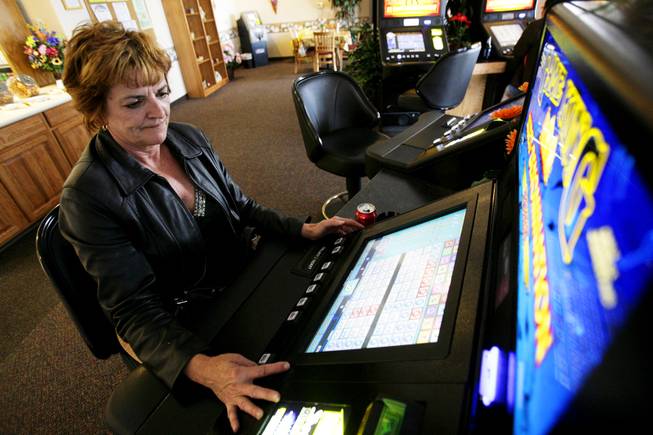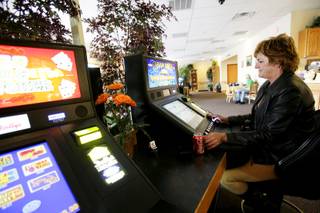
Cindy Clark plays a slot machine at Dotty’s near Eastern and Serene in Henderson on Thursday, March 24, 2011.
Tuesday, March 18, 2014 | 5:30 p.m.
When Clark County commissioners set new regulations meant to rein in the rapidly growing slot parlor industry in 2011, they included specific definitions on everything from what a kitchen is to how big a business with up to 15 slot machines needed to be.
But it’s what commissioners failed to define that has led to concerns that large operators like Dotty’s and other taverns are skirting the intent of the law.
The regulations passed in 2011 required that taverns with the proper gaming license could have up to 15 slot machines, so long as the revenue from gambling was incidental to the primary business of serving food and alcohol.
But “incidental” was never defined, meaning some taverns are generating up to 80 percent of their revenues through gaming, something Commissioner Steve Sisolak said is not the intent of the 2011 rules.
“We don’t have a problem if you have 15 (slot) machines because the bar is doing an enormous amount of business. It’s like a pool table. It’s an amenity,” Sisolak said. “If it’s your main business, that’s where the problem comes up.”
Commissioners voted unanimously Tuesday to impose a moratorium banning any new business licensing applications for taverns with Class A Slot Machine Licenses for 90 days, giving staff time to come up with specific definitions for what constitute “primary” and “incidental” sources of business.
The decision reignites a long simmering battle between the casino industry at large and slot parlors, which have proven a popular draw for local gamblers in search of a low-key environment to play the slots. The back and forth between the sides has persisted for years, with state and local governments often forced to referee.
At Dotty’s and several other tavern chains with similar business models that have sprouted at strip malls across the valley, food and alcohol is offered, but it’s often an afterthought to slot machines.
But tavern industry representatives say their businesses are complying with the 2011 regulations while proving to be steady, reliable tenants and job creators during the economic downturn.
“When the sewing store didn’t make it, when the puppet store didn’t make it, they have survived, they have paid rent, they have hired employees,” said attorney John O’Reilly, representing tavern operators and their trade association.
Any regulatory changes could also affect the hundreds of bars and taverns that rely on slot machines for part of their revenues, even if isn’t their primary business.
“Incidental” revenue to a business could be determined in several ways, Sisolak said, whether it’s based on percentage of gross revenues, the size of a business or another standard. If businesses want to continue offering slot machine play with minimal food and beverage sales, another option would be to reduce the number of allowable machines from the current maximum of 15, Sisolak said.
“Last time I don’t think we did what we needed to do. We defined a bar, a kitchen, we defined food. This time we have to define incidental and primary,” Sisolak said. “We’ve got to come up with something that’s fair to everybody.”


Join the Discussion:
Check this out for a full explanation of our conversion to the LiveFyre commenting system and instructions on how to sign up for an account.
Full comments policy